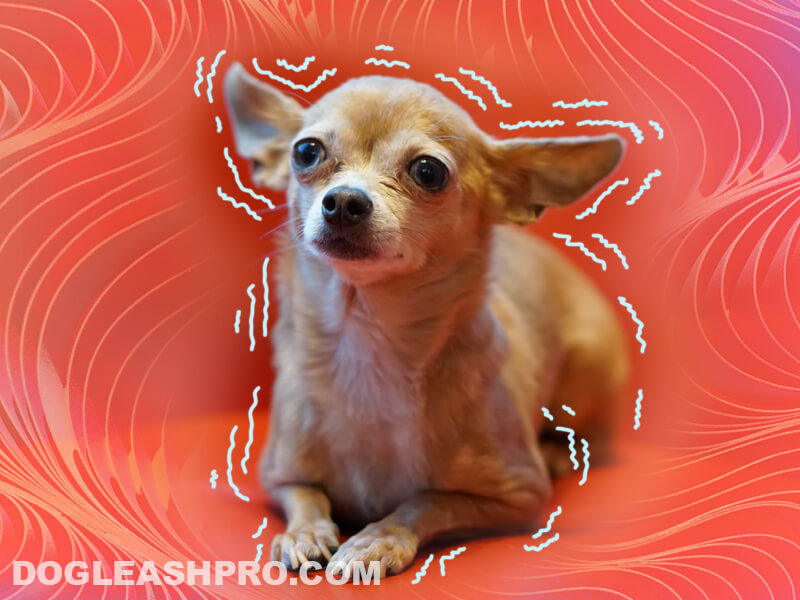
Many people assume that Chihuahuas are naturally nervous dogs that shake a lot, but this assumption is incorrect because there is usually a reason why they may be shaking. In this article, we discuss in detail 21 reasons why your Chihuahuas shake. A shaking Chihuahua can also cause a good amount of shedding so be prepared for that as well.
Why do Chihuahuas shake? Chihuahuas don’t tremble for no reason, and their shivering can mean that something is bothering them. Depending on the environment, health, age, and size, there could be several reasons why your Chihuahuas shake.
Table of Contents
Why Do Chihuahuas Shake: 13 Reasons Why

1. High metabolism
Chihuahuas are energetic little dogs with a high metabolism. They get short bursts of energy which shows as shivers when they are anxious, excited, or afraid.
Due to their small frame, they also lose a lot of that energy quickly. As a result, Chihuahuas also lose much of their body heat and end up feeling cold. All these factors make Chihuahuas shake and jittery.
2. Cold
Cold is the simplest explanation why your Chihuahuas may be shaking. After all, that is what we do when it is chilly. Shaking and shivering is the body’s natural way to warm itself. Even if you have a long-haired Chihuahua, he can still get cold, especially during the winter.
If your Chihuahua is shaking or shivering, try wrapping them in a warm blanket or snuggling with them to see if they stop.
3. Anxiety
Fear or anxiety can drive a Chihuahua to a shaking fit. Loud fireworks, crowds, noises, traffic, and thunderstorms are common sources of fear among Chihuahuas.
Comfort your little pooch in these situations and get them accustomed to city noises and people if they have never experienced that before. If you need help, we highly recommend that you speak with your vet or a professional Chihuahua trainer to help with your Chihuahuas’ shaking due to anxiety.
You might also want to read: Why Are Chihuahuas So Aggressive? 7 Shocking Reasons
4. Excitement
Chihuahuas are little balls of energy when they are excited. The thought of a stimulating activity like walking, playtime, or meeting their human owners after a long time often makes them unable to contain their happiness, and Chihuahuas will often shake with joy.
5. Stress
The stress of a new home, losing a friend, or being away from their human companion can profoundly affect a dog as loyal and sensitive as a Chihuahua. These emotions often manifest as shaking. Kindness and affection is the best way to comfort such a dog.
6. Low blood sugar (Hypoglycemia)
Hypoglycemia can be fatal for a small dog like a Chihuahua. These high-energy canines can run out of blood sugar pretty quickly, and when that happens, shaking is the first symptom to appear.
7. Allergies
If your little Chihuahua is allergic to a particular ingredient, their bodies will show a reaction to it in the form of shaking. When trying new food, always start with a small quantity and gauge their response before adopting it as a regular meal.
8. Old age
Chihuahuas have a very long lifespan, and a good portion of it is spent in old age. If your senior Chihuahua seems to have shaking fits, there is possibly no reason for it other than the dog’s age. Nevertheless, it is essential to visit the vet regularly if your Chihuahua is in its senior years.
9. Toxicity
Chihuahuas have a small body, meaning it wouldn’t take too much of a toxic ingredient to mess with their body functions. Vomiting, drooling, dry heaving, and violent shaking are signs that your canine companion has eaten something poisonous.
10. Pain
Pain is another reason for your Chihuahua’s shaking. If they’re suffering from an injury, having a stomach ache, or even emotionally hurt, they will express it in the form of shaking. Showing affection and caring for them is crucial during this time, as they need assurance that you are there for them.
11. Injury
Chihuahuas are delicate dogs, and if your little Chihuahua has broken a toenail, taken a fall, injured a limb, or got beaten up by some other dog, they would often cry in pain and shake uncontrollably.
Chihuahuas could also be suffering from an internal injury, so if you can’t see any physical wounds, we highly advise that you still bring them to the vet and get them checked.
12. Poor social skills
Some Chihuahuas, who weren’t acclimated to other dogs or people during their early years of childhood, never develop appropriate social skills. While some Chihuahuas show this in the form of aggression, others shake with anxiety.
If your Chihuahua shakes in the presence of other dogs or humans, you may have to train them to be more social. If you need help with this, consult with your vet or hire a Chihuahua trainer.
13. Health issues
Aside from environmental and psychological factors, the shaking of a Chihuahua can also be attributed to health troubles. Several health conditions cause Chihuahuas to shake and tremble uncontrollably, and such issues need to be addressed on a priority basis.
Why do Chihuahuas shake so much: 9 Health Conditions That Cause Shaking

1. Fever
A high fever can cause Chihuahuas to shake. If your little buddy is shaking without any apparent reason, make sure to take their temperature. The nominal body temperature for Chihuahuas is 101°F to 102.5°F. If your little buddy has a temperature that is higher than 102°F, take them to a vet as soon as you can.
2. Distemper
Canine distemper is a virus that attacks young dogs and unvaccinated or partially vaccinated canine adults. Besides shaking, this disease also causes fever, coughs, and runny eyes and nose.
3. Kidney disease
A failing kidney can also cause shakes in Chihuahuas. These tremors will often accompany other signs, such as weakness, pale gums, disorientation, and an odd smell. Take your Chihuahua to a vet as soon as you notice any of these symptoms.
4. Generalized Tremor Syndrome
Generalized Tremor Syndrome, or GTS, is a condition that can appear in all kinds of dogs for no apparent reason. Chihuahuas between the ages of 9 months and 2 years are especially vulnerable to this disease.
This is why routine vet visits are important. These visits will help to detect any disease in your Chihuahuas early. If you don’t have pet insurance, consider signing up for one.
5. Ear infection
Chihuahuas can sometimes produce excessive ear wax. If not cleaned regularly, this earwax can trap dust and breed nasty microbes, which can cause an infection. If you have a Chihuahua with floppy ears, make sure their ears are cleaned regularly because they are prone to ear infections.
While ear infection doesn’t cause full-body shakes, it does cause the dog to shake its head frequently.
6. Nausea
Nausea can cause disorientation and loss of spatial awareness, but it can also cause shakes and tremors. Several things can make a Chihuahua nauseous, including motion sickness, stomach ache, food poisoning, and medicines.
7. Seizures
A shaking Chihuahua could be having a seizure. Seizures can be caused by organ failure, hypoglycemia, toxicity, epilepsy, and other neurological disorders. Since all these causes are of grave concern, immediate veterinary assistance is the best course of action.
8. Neurological disorders
Muscle twitching and shaking can often arise from disorders of the brain and the central nervous system. Several diseases can make it happen, the most prominent being epilepsy. This disease causes fits of loss of consciousness or uncontrollable shaking, foaming at the mouth, and drooling.
9. Demyelinating diseases
Demyelinating diseases arise when the protective coating of the nerves deteriorates and gets replaced by scar tissue. It can be caused by a virus, injury, asphyxiation, inflammation, or genetic disorder.
Chihuahuas shaking myths
Many people believe shaking to be a natural Chihuahua habit and take it lightly. But although Chihuahuas are better known for shaking than most other dogs, they don’t shake or tremble without reason. If your Chihuahua is shaking and having tremors, you need to take necessary actions to stop it.
Another popular misconception is that Chihuahuas shake when they are nervous. While stress can cause certain Chihuahuas to shake, Chihuahuas are generally confident and bold dogs that don’t get nervous easily.
In fact, it’s the shivering and shaking that makes Chihuahuas nervous and not the other way round.
Why do Chihuahuas shake a lot?
Chihuahuas shake because of their fast metabolism and inability to regulate body temperature. Chihuahuas spend almost three times as much energy as a bigger dog, and this shows in the form of shaking. They also don’t like the cold, and shaking or shivering is a way for the Chihuahua’s body to warm itself up.
Why do Chihuahuas shake and pant?
Chihuahuas shake because of their high metabolism, which also tires them quickly, causing them to pant. But if your Chihuahua is shaking and panting excessively, he or she might be suffering from pain or discomfort.
If your Chihuahua just ate something toxic, he or she might be poisoned. Your vet or the local poison helpline will assist you best in this matter.
Why do Chihuahuas shake when they sleep?
You may notice your Chihuahua shake and twitch while sleeping. Experts believe this to be perfectly normal behavior that all dogs display. Dogs shake during their sleep because they are dreaming, and their shaking isn’t a sign of fear.
However, you might also want to make sure your Chihuahuas are staying warm while sleeping. Provide an extra throw next to them in case they need it.
Why do Chihuahuas always shake?
Chihuahuas don’t like low temperatures, and shaking is a way to warm their bodies up. Even if it isn’t too cold for you, it might be uncomfortable for your four-legged friends. You can stop their constant shaking by having them wear warm sweaters.
Why do Chihuahuas shake and shiver?
Chihuahuas are usually bursting with energy which they lose quicker than most dogs. They shake and shiver a lot after they’ve just had their meal, using up all the fuel they just stocked up on.
Giving Chihuahuas adequate exercise and multiple small meals a day helps keep them calm and stocked on energy.
Why do teacup Chihuahuas shake?
Teacup Chihuahuas are an even tinier version of an already small dog. The conditions that cause teacup Chihuahuas to shake are the same as their large counterparts. However, due to their small size, teacup Chihuahuas are more susceptible to shaking and shivering even if the conditions are not that intense.
So, Why Do Chihuahuas Shake?
As you can see, there are numerous reasons why Chihuahuas shake. It could be due to how the Chihuahuas are feeling or it could be due to the temperature in the environment or health conditions that your Chihuahuas are prone to.
Whatever the reasons may be, you are now aware of what can cause Chihuahuas to shake. If you notice your Chihuahua shaking more than usual, we highly recommend that you bring your small pooch to see the vet as soon as you can.
Related Questions
Chihuahuas have tiny bodies, high metabolism, and poor body temperature regulation. They spend their energy quickly, and it shows in the form of body shaking and tremors. The shaking can also be attributed to cold or fear.
Try to pinpoint the reason for your Chihuahua’s shaking and eliminate it. Wrap the dog in a blanket, or remove any environmental stressors that might be causing your Chihuahua to shake. If nothing you’re doing helps, it’s a good idea to visit the vet.
Chihuahuas don’t shake for no reason. Several environmental factors and health issues also cause this behavior. If your Chihuahua is behaving in a way you’ve never seen, seek veterinary help.
DISCLAIMER: THIS WEBSITE DOES NOT PROVIDE MEDICAL ADVICE
The information, including but not limited to, text, graphics, images and other material contained on this website are for informational purposes only. No material on this site is intended to be a substitute for professional veterinary advice, diagnosis, or treatment. Always seek the advice of your veterinarian or other qualified health care provider with any questions you may have regarding a medical condition.
Resources:
https://en.wikipedia.org/wiki/Chihuahua_(dog)
https://onlinelibrary.wiley.com/doi/abs/10.1002/jnr.23710

With over five years of specialized experience as an animal writer, my expertise lies in dog nutrition, health, behavior, grooming, and training. I am dedicated to delivering helpful and informative content that caters to the well-being of our furry friends. My primary goal is to empower pet owners with knowledge and ensure our canine companions thrive in health and happiness. In my free time, I love volunteering at local dog rescue centers.







